Engaged in the clothing industry for 20 years.

From an asteroid to a small planet: Berlin Fashion Week reaches for the stars
Berlin Fashion Week is reaching for the stars in the fashion world. It is evolving from a small, insignificant asteroid in the orbit of the major fashion weeks of Paris, Milan, and London to a small planet of its own. Hopefully, the German capital will stay on this course and not fizzle out in the atmosphere again.
An exciting mix of streetwear, experimental and provocative designs with great attention to detail attracted an international audience to the German capital this week – including buyers from London boutiques such as LN-CC and Browns. International trend-setting brands like GmbH and Anonymous Club presented their collections on the catwalks, as did newcomers such as Clara Colette Miramon and representatives of the local brand such as Richert Beil and Haderlump, who have grown over the past seasons. Some brands received support for their shows from big names such as Ed Hardy, Puma, and Timberland.
The backing and efforts of the Fashion Council Germany are an important part of the reason why Fashion Week was able to offer such an international line-up of brands and visitors.
We have summarised the highlights of the week for you here.
Swimming with dolphins
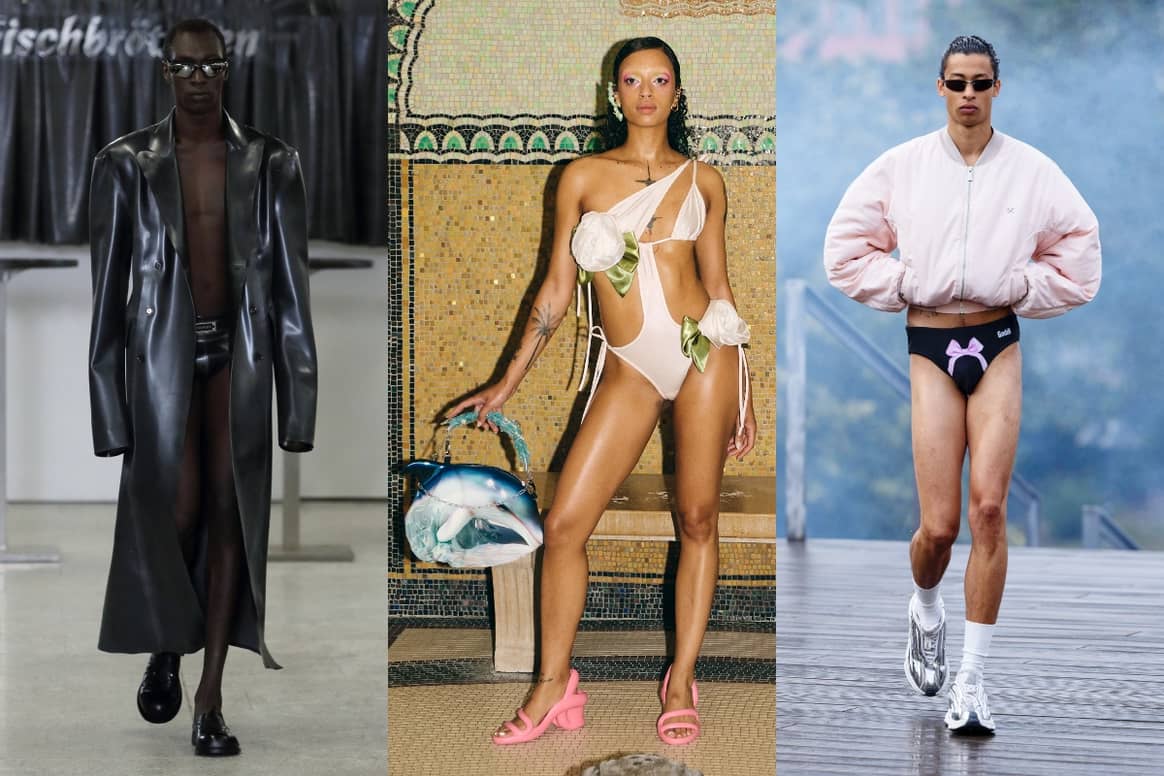
What would a spring/summer season be without a little swimwear? Several brands proved that swimwear can be more than just simple Speedos and bikinis. Berlin label GmbH, which showed in its home country for the first time and is elsewhere active at fashion weeks such as Paris and Milan, presented a tight black swimsuit with a ‘pink bow’ print in its “Resistance Through Rituals” collection. This was combined with a delicate pink bomber jacket. This season, the GmbH duo Benjamin Huseby and Serhat Isik dealt with the “revival of fascism”, its social consequences, and celebrated those who resist.
Berlin duo Jale Richert and Michele Beil behind the brand Richert Beil showed black neoprene swimsuits in various lengths as part of their “swimwear show”. They were accompanied by other pieces such as a neoprene coat and a crop top with air cushions that resembled inflatable armbands – all in deepest black. According to the label, the “Gothic meets North Sea vacation” vibe was inspired by people who are not fans of typical summer fashion.
Kitschy Couture designer Abarna Kugathasan planned a very special journey for the agenda. She sent the protagonist of her “Artificial Paradise” collection on a honeymoon, which she enjoyed on a large swan air mattress in the pool – dressed only in bikini panties with ribbons wrapped around her stomach and legs. The Stadtbad Neukölln, a public swimming pool in Berlin, was chosen as the location, where the designer presented further looks such as deconstructed swimwear, a slim-cut skirt with a mermaid pattern, and dolphin accessories.
SF1OG, meanwhile, brought a different fish ashore – or rather to the market. The weekly market was the central theme of the Berlin brand of Rosa Marga Dahl and Jacob Langemeyer. In addition to visitors strolling through stalls with their bags and even dogs, SF1OG also characterised some of the traders, who in the case of a fishmonger were represented by fish bait and rakes. Details such as aprons, tea towels, and shopping bags, which were integrated into various pieces, rounded off the theme.
Through the city
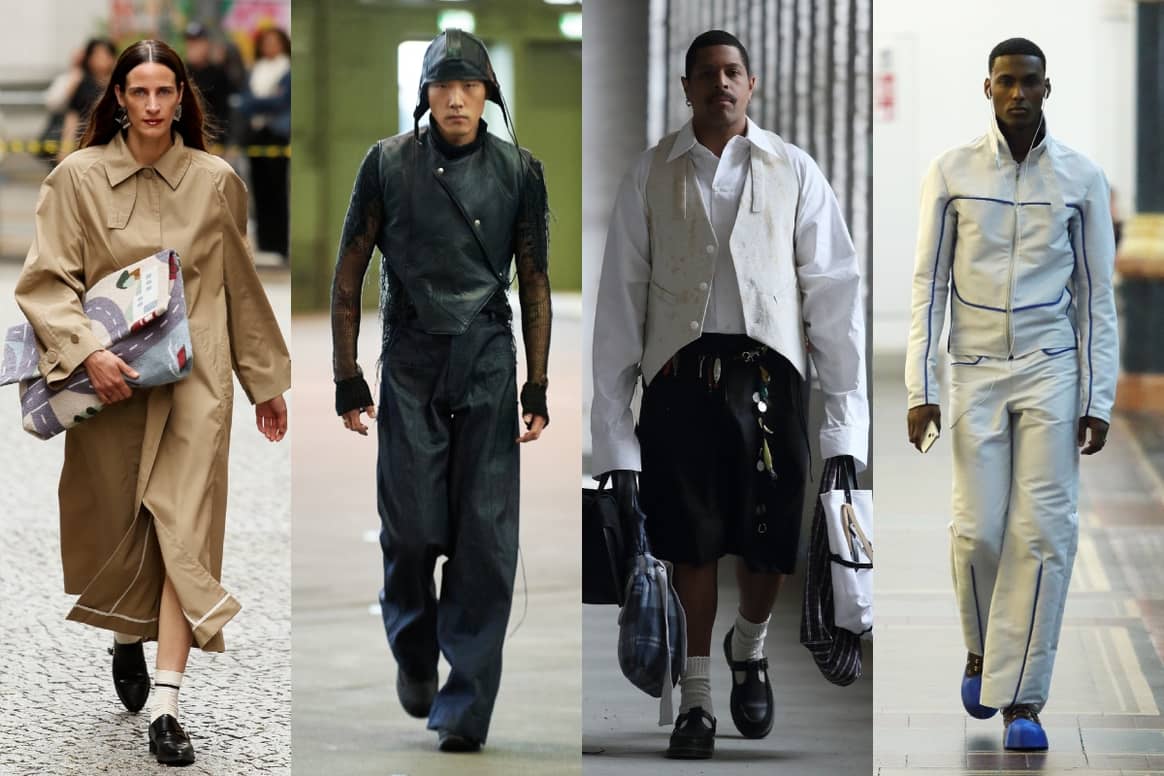
This season, several brands were focused on daily life in the city and movement. In addition to SF1OG’s walk through the weekly market, Avenir addressed the topic of locomotion. In the immediate vicinity of Potsdamer Platz, a public square, the label, which is also based in the German capital, showed a collection that revolved around commuters. Under the name “Commute”, founder Sophie Claussen showed looks that could be worn from the bedroom – styles that were based on striped pajamas – to the office. Casual two-pieces – some made of denim – as well as elegant dresses were on display. With attention to detail, she underlined the theme with accessories such as a ‘street’ play carpet as a bag, geometric patterns and patchworks that were reminiscent of tiles and seat covers in subway stations, and golden train tickets as earrings.
Alan Balletshofer, meanwhile, was inspired by arriving in a new city and how people adapt to their new home. For the founder of the Berlin brand, it seemed to be about not standing out from the crowd, because the “2024 – 006” collection focused on a simple colour palette with a lot of grey and black as well as a minimalist design.
In contrast, Haderlump was all about surpassing oneself. The focus was on aviation pioneer Amelia Earhart, who was the first woman to fly solo across the Atlantic. Haderlump makers Julius Weissenborn and Johann Ehrhardt showed their ‘Aero’ collection in Hangar 6 at Tempelhof Airport between old airplanes. Bomber jackets made of recycled parachute fabrics, leather aviator jackets and hoods, and denim uniforms reminiscent of mechanics symbolized the high-altitude flight.
Big hood
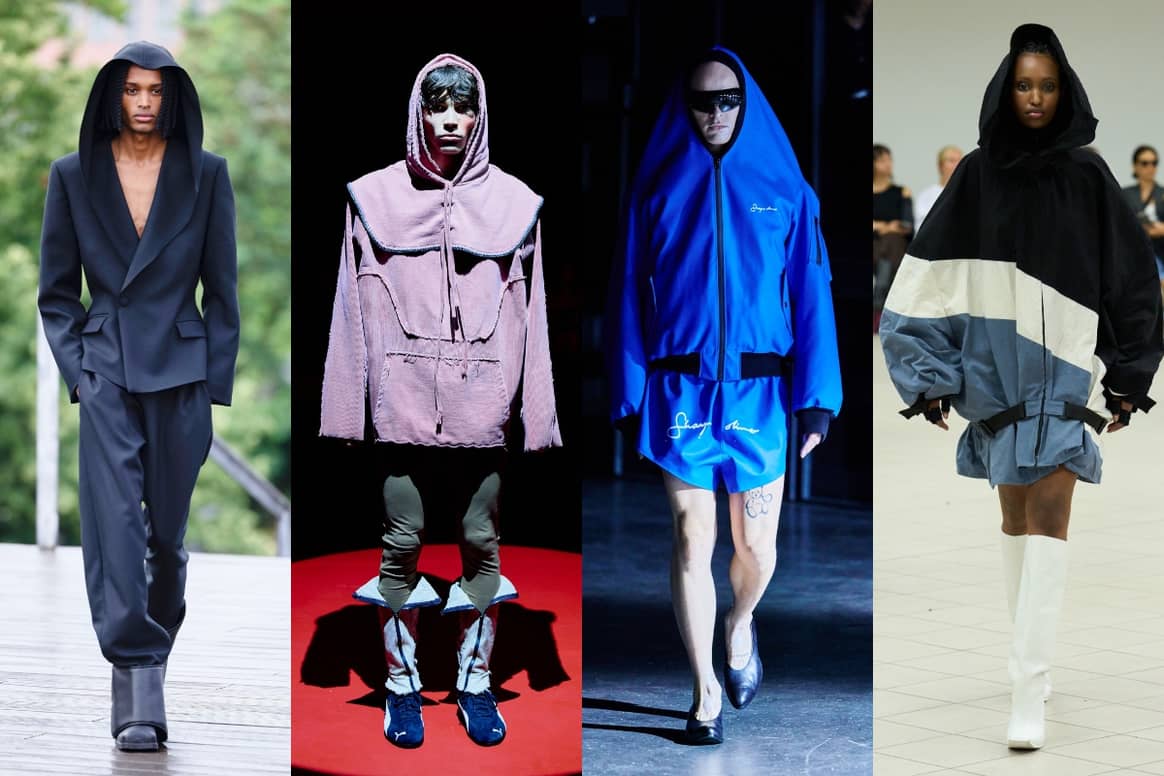
In addition to thematic similarities, there were also some overlaps in the silhouette. Three of the four brands that presented as part of the ‘Intervention’ showcase by Berlin PR agency Reference Studios featured hoods. GmbH presented pointed cape hoods that transitioned into the lapels of jackets. London-based designer Marie Lüder, who draws inspiration for her collections from medieval armour and characters, showed the sporty version of a monk’s hood.
The third in the ‘Intervention’ group was New Yorker Shayne Oliver, who played with silhouettes and asymmetry with his experimental label Anonymous Club and integrated sporty references such as soccer jerseys. Blanket coats covered the entire head and bomber jackets with integrated hoods made it look as if the models couldn’t force their heads through the collar. The avant-garde collection also attracted an international audience including scandal rapper Kanye West, who hid under his own hood.
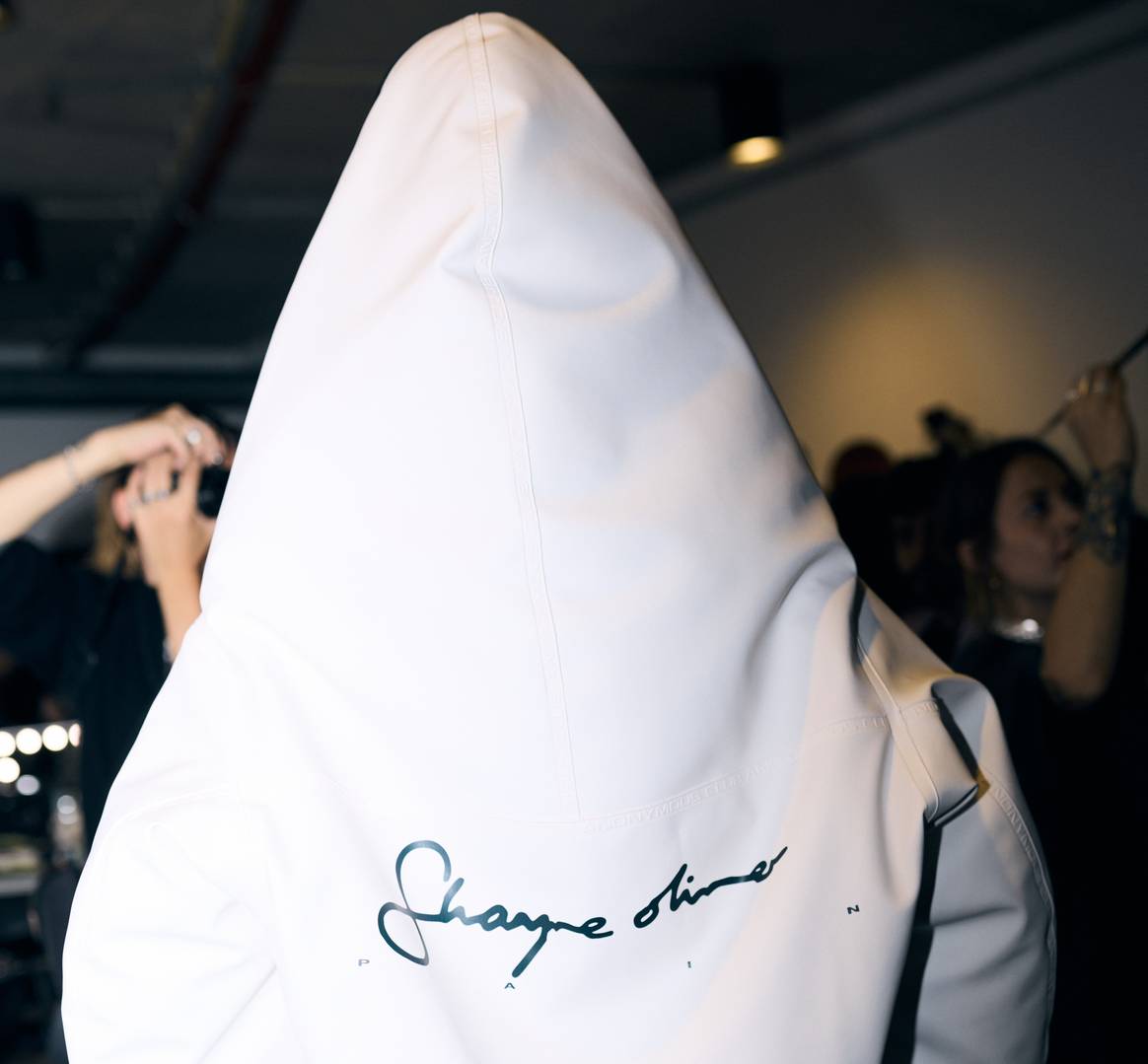
Danish designer Sia Arnika placed several boxes filled with flies at the center of her show and used the insects as inspiration. She showed a wide knee-length coat that was reminiscent of a ski jacket in terms of closures and design. A large hood was also integrated into it.
Restructuring
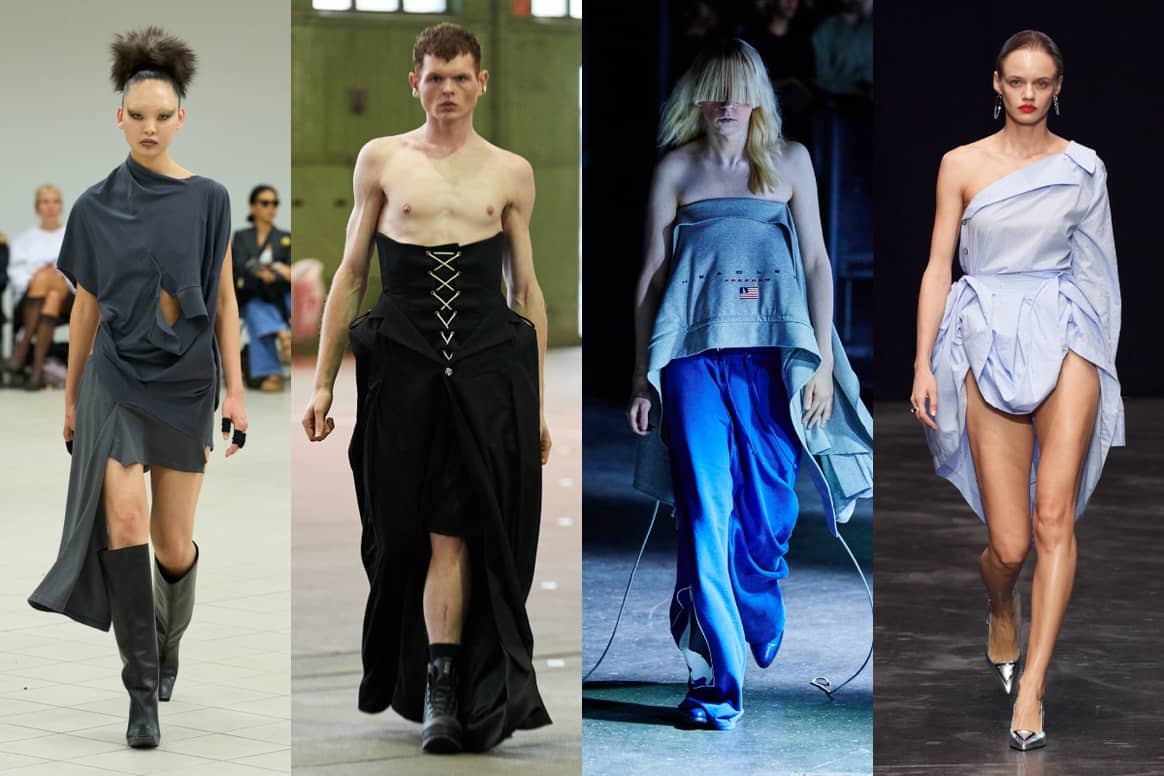
Asymmetry played a major role in many collections during Berlin Fashion Week. Some of the brands used this to put pieces in a new context and sometimes even turn them into a different garment. Sia Arnika turned the classic polo shirt inside out, alienated the collar as a cutout at waist height, and thus deprived it of its practical use. This resulted in asymmetrical tops and dresses. Kilian Kerner also took on the shirt and turned it so that the collar lay on one shoulder and the other was exposed. Anonymous Club presented shoulders on a recycled sweater and narrowed it to a top at the chest with a looser fit at the bottom. Haderlump pushed down an entire jacket and turned it into a skirt that was combined with a laced corset.
Well laced
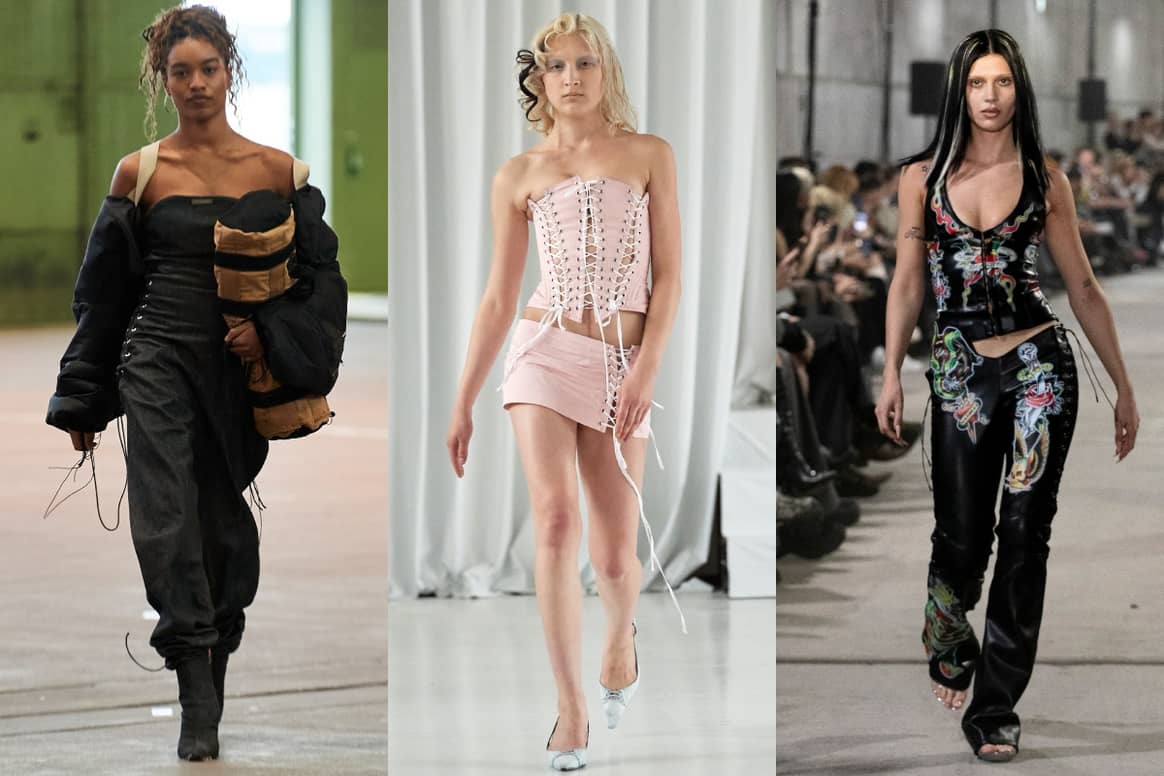
Lacing, especially on corsets, was also popular this season. Haderlump showed several tightly laced tops in its aviator collection, as did Clara Colette Miramon. The Berlin-based label delivered a homage to “the often overlooked surrealist women” in its first runway show. This resulted in several laced two-pieces – in patent pink and blue denim – consisting of a skirt and top that were laced at the side. Namilia was another to favour leather, with several pieces in the material complete with side lacing. For its own collection, the Berlin-based label showed long leather pants, corsets, and skirts in this style.
The collaborators
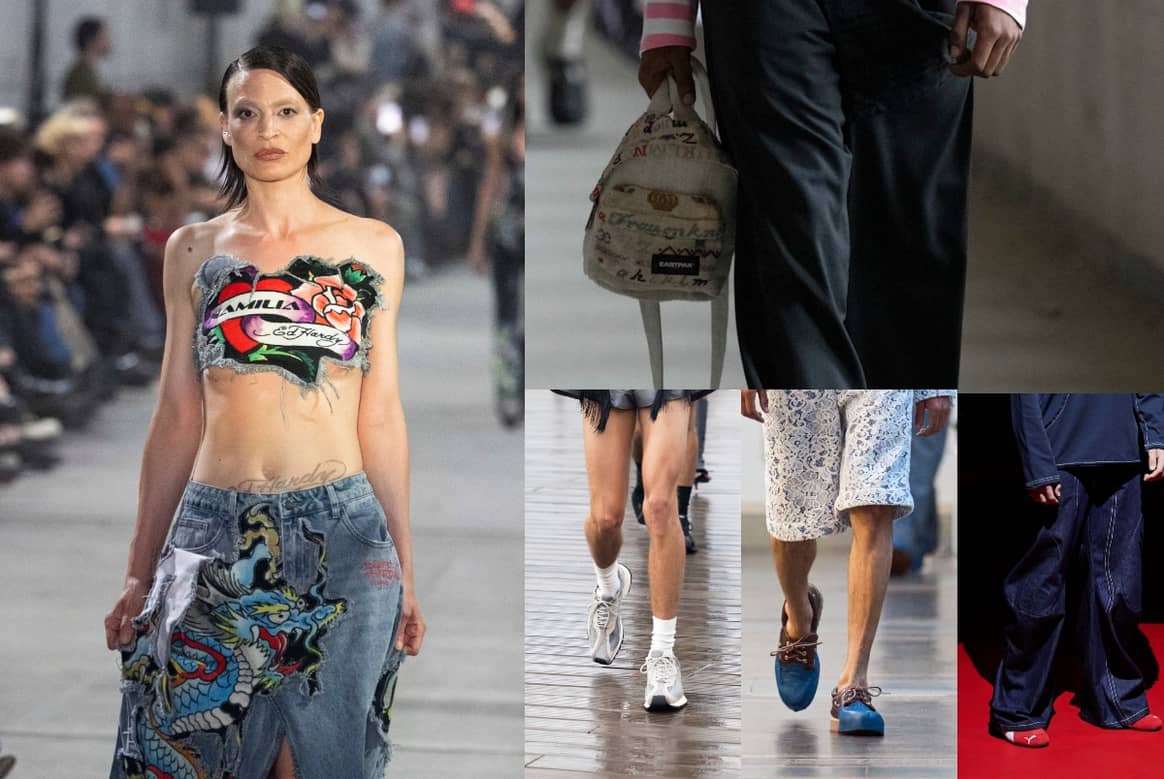
Collaboration was also rife at Berlin Fashion Week. Herzogenaurach-based sporting goods manufacturer Puma, for example, provided Lueder with its hyped ‘Speedcat’ sneaker model. Balletshofer, meanwhile, gave the classic boat shoe silhouette of the US brand Timberland an update with a blue and black cap, and GmbH collaborated with Axel Arigato for a sneaker collection in silver metallic with elements of chain mail and armoured metal. SF1OG created various mini backpacks and bags together with bag supplier Eastpak, and Namilia used staple motifs from Ed Hardy – ‘old school tattoo’ designs such as dragons, tigers, roses, and pin-ups – for a large part of the collection.
FashionUnited was invited to Berlin by the Fashion Council Germany.
This article originally appeared on FashionUnited.DE. Translation via AI and edit by Rachel Douglass.


